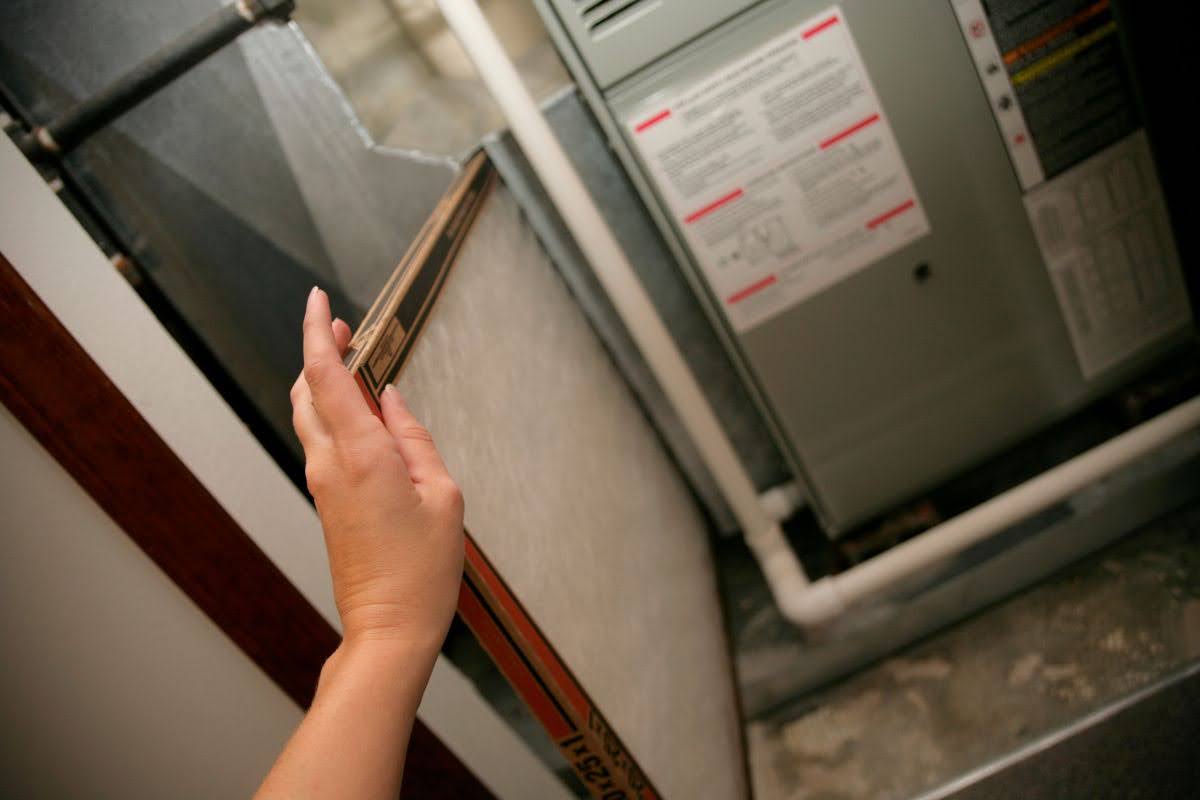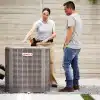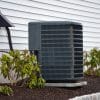When your AC unit freezes up, it can disrupt your comfort and increase your energy costs.
Understanding why this happens is key to preventing future issues and ensuring your home heating and cooling system runs efficiently.
Keep reading to learn more!

1. Low Refrigerant Levels
One of the primary reasons an AC unit may freeze is due to low refrigerant levels. Refrigerant is the lifeblood of your air conditioning system, absorbing heat from your home’s air and releasing it outside. When there is not enough refrigerant, the pressure within the system drops, significantly lowering the temperature of the evaporator coil. If the coil’s temperature drops below freezing, humidity from the air condenses on the coil and freezes, leading to an ice buildup that impedes the unit’s performance. Regular checks for leaks and proper refrigerant levels can prevent this issue.
2. Insufficient Airflow
Airflow is crucial for an AC unit to function properly. If the airflow across the evaporator coil is restricted, it can’t absorb enough heat to operate correctly. Common causes of reduced airflow include dirty air filters, blocked vents, or malfunctioning fans. Such blockages can make the evaporator coil too cold, causing the condensation on the coil to freeze. To prevent this, make sure to replace or clean air filters every 30 to 90 days, ensure vents are not blocked by furniture or drapes, and check that all fans are functioning correctly.
3. Faulty Thermostat Settings
Incorrect thermostat settings can also lead to an AC freeze. If the thermostat is set too low, especially during cooler nighttime temperatures, the AC may run continuously, lowering the temperature of the coils excessively. To avoid freezing, it’s advisable to keep the thermostat set at a moderate temperature, typically no lower than 72 degrees Fahrenheit. This setting prevents unnecessary strain on the AC and avoids overcooling, which can lead to freezing.
4. Dirty Coils
The evaporator coils can become coated with dirt and debris over time. When the coils are dirty, they can’t transfer heat effectively, leading to colder temperatures that may cause freezing. Cleaning your evaporator coils regularly helps maintain their efficiency and prevents buildup that can lead to freezing.
5. Outdoor Temperature
Using your AC when the outside temperature is too low can also cause the unit to freeze. Most AC systems are not designed to operate in temperatures below 60 degrees Fahrenheit. In cooler temperatures, the refrigerant pressure drops, which can cause the system to freeze. Avoid using the air conditioner in cool weather, or switch to the fan-only mode to maintain airflow without cooling.
6. Mechanical Failures
Mechanical issues such as a failing blower fan or kinked refrigerant lines can lead to a freeze. If the blower fan is malfunctioning, it won’t circulate enough air over the coils, causing them to get too cold and freeze. Similarly, kinked refrigerant lines can restrict the flow of refrigerant, leading to lower pressures and temperatures that can freeze the coils. Regular maintenance from a professional can help identify and fix these mechanical issues before they cause significant problems.
What to Do If Your AC Freezes
If you discover a frozen air conditioning system, immediate action can help minimize damage and restore your system’s functionality quickly.
1. Turn Off Your AC Immediately
Turning off your AC is the first and most critical step when you notice it has frozen. This action stops the compressor and other mechanical parts from operating under strained conditions, which can worsen the situation and lead to more serious mechanical failures. Moreover, shutting down the unit halts the buildup of more ice, which can damage the coils and lead to costly repairs.
2. Thorough Inspection and Replacement of Air Filters
One common reason for AC freezing is restricted airflow, and a frequent culprit is dirty or clogged air filters. Inspect regularly and replace your filters if they appear dirty. This not only helps maintain optimal airflow but also enhances the overall air quality in your home. Clean filters allow the air to move freely, reducing the chances of it freezing over the coils. It’s advisable to check your filters once a month during peak usage times.
3. Clean Around the Outdoor Unit
The outdoor component of your air conditioning system, known as the condenser, needs clear airflow to function efficiently. Leaves, debris, and dirt can accumulate around this unit, especially after stormy weather or during the fall when leaves drop. Clearing the area around your outdoor unit ensures that nothing obstructs the airflow, helping to prevent issues that could cause freezing. A clean surrounding area allows the condenser to expel heat more effectively, which is crucial for the proper performance of your AC or HVAC system.
4. Check the Thermostat Settings
Incorrect thermostat settings can also lead to your air conditioner freezing. If the thermostat is set too low, especially during cooler nights, the AC may not cycle off appropriately, causing it to over-cool and freeze. Ensure that your thermostat is set to a reasonable temperature, typically no lower than 72 degrees Fahrenheit, to prevent overcooling. Consider using a programmable thermostat that adjusts temperatures at different times of the day or night to optimize efficiency and comfort.
5. Call a Professional
If, after taking the above steps, your air conditioning unit continues to freeze, it could indicate a more serious underlying issue, such as a refrigerant leak or a significant mechanical failure. These problems require professional attention. A licensed HVAC technician has the tools and knowledge to safely diagnose and repair your system. Professional intervention ensures that the job is done correctly and safely, protecting your investment in your home’s heating and cooling system.
Conclusion
Preventing your air conditioner from freezing involves routine maintenance, correct settings, and timely interventions. Understanding the common causes of freezing can help you identify and resolve issues quickly, maintaining both efficiency and comfort in your home.
We recommend you to call an AC repair service to ensure the problems are fixed properly, and safely.





